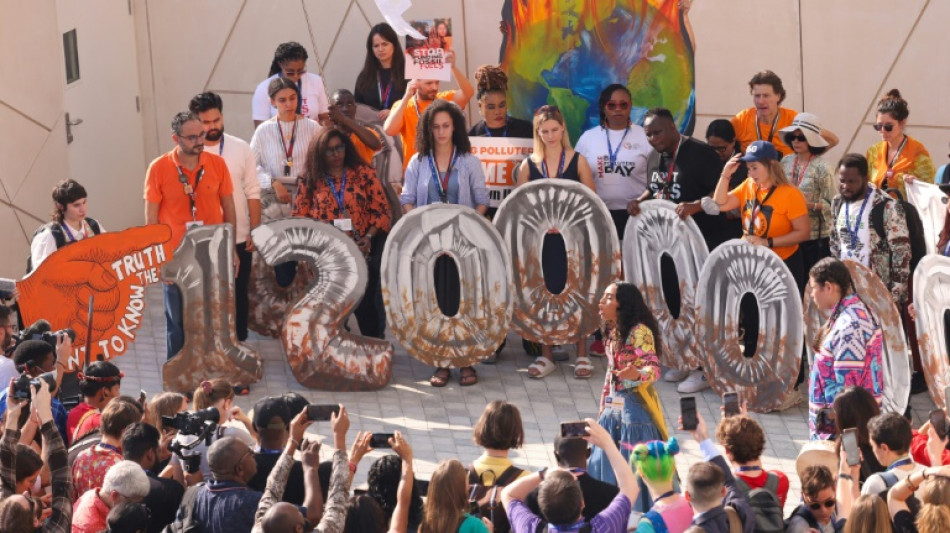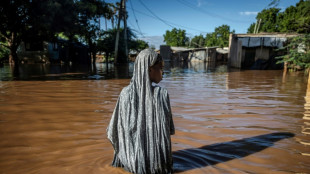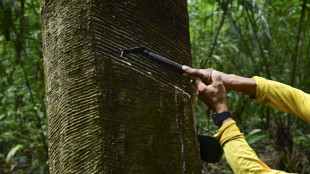

COP28 fossil fuel battle hardens despite new warning on warming
Battle lines on fossil fuels hardened at UN climate talks on Tuesday despite scientists warning that global warming could breach the 1.5C threshold within seven years.
A new COP28 draft agreement in Dubai included the options of phasing out fossil fuels or not addressing the issue at all, setting the stage for tough negotiations due to end next week.
Saudi Arabia -- the world's biggest oil exporter -- took a hardline stance, saying it would "absolutely not" agree to phasing down fossil fuels, never mind phasing them out.
The thorny debate over the future of fossil fuels, the biggest cause of global warming, is the key battleground at the COP28 meeting hosted by the oil-rich United Arab Emirates.
- 'Extremely unhappy' -
The latest version of a potential agreement included three options -- an "orderly and just" phase-out, faster efforts to phase out fossil fuel projects that do not capture and store emissions, or "no text" on the subject.
An earlier draft, prepared by the UK and Singapore, that proposed a "phasedown/out" was badly received by delegates, a Latin American negotiator told AFP.
"Everyone was extremely unhappy with the first draft," the negotiator said, requesting anonymity.
"When we started talking... everything collapsed... There is pretty much nothing on the way forward," the delegate added.
Saudi Arabia's energy minister said he would "absolutely not" agree to a phase-down of fossil fuels in the COP28 agreement.
"I would like to put that challenge for all of those who... come out publicly saying we have to (phase down)," Prince Abdulaziz bin Salman told Bloomberg.
"Call them and ask them how they are gonna do that?"
- 'Elephant in the room' -
Laurence Tubiana, the architect of the landmark Paris climate accord in 2015, said the negotiations are "difficult because we're at a stage where all options are on the table and we don't see a balancing point.
"On one hand it's normal at this stage but it seems particularly difficult because we're talking about the elephant in the room, which is fossil fuels," Tubiana told AFP.
- Record oil lobbyists -
Nearly 2,500 fossil fuel lobbyists -- a record -- have been accredited for UN climate talks in Dubai, campaign groups said.
The NGO umbrella group Kick Big Polluters Out said 2,456 people tied to fossil fuel interests were identified, roughly four times the number at COP27 last year.
If taken as a group they outnumber "every country delegation" apart from Brazil and the UAE, the coalition added.
Campaigners have worried about the influence of the fossil fuel lobby since Sultan Al Jaber, the head of the UAE's national oil company ADNOC, was named president of COP28.
- 1.5C alive? -
The annual Global Carbon Project estimated Tuesday there is a 50 percent chance warming will exceed the 2015 Paris deal's goal of 1.5 degrees Celsius over multiple years by around 2030.
Fossil fuel CO2 pollution also rose 1.1 percent last year, according to an international consortium of climate scientists in their annual Global Carbon Project assessment, with surging emissions in China and India -- now the world's first and third biggest emitters.
Projected global warming has risen slightly -- by 0.1C -- the Climate Action Tracker said in its annual update on government plans, putting it at a catastrophic 2.5C above pre-industrial levels by the end of the century, the group said.
"Despite their promises, governments have not taken enough action to drive down warming projections, with some instead turning to false solutions such as carbon capture and storage to continue the world's reliance on fossil fuels," it said.
- 'Kick big polluters out!' -
Dozens of people protested inside the COP28 venue Tuesday under blistering sun, holding up signs reading "Phase out fossil fuels now" and "Stop funding fossil fuels".
"Kick big polluters out!" they chanted.
"If the United Nations continues to allow the fossil fuel industry to lead climate mitigation and to lead COP... I have zero confidence that COP will be successful," Thomas Harmy Joseph, a member of the US-based Indigenous Environmental Network, told AFP.
C.Rastoder--LiLuX



